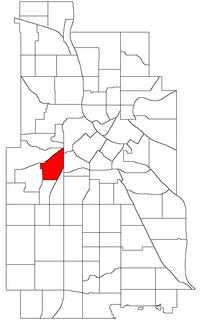Lowry Hill, Minneapolis: Difference between revisions
→See also: +Virginia Triangle |
Edited "Hennepin Avenue to the southwest" to read "Hennepin Avenue to the southeast" |
||
| Line 76: | Line 76: | ||
|2010= 3760 |
|2010= 3760 |
||
}} |
}} |
||
'''Lowry Hill''' is a neighborhood within the [[Calhoun Isles, Minneapolis|Calhoun-Isles community]] in [[Minneapolis, Minnesota]]. The neighborhood is named for the [[terminal moraine]] on which it sits, a hill named after late nineteenth century real estate mogul and trolley tycoon [[Thomas Lowry]]. Its boundaries are [[Interstate 394]] to the north, [[Interstate 94]] to the west, [[Hennepin Avenue]] to the |
'''Lowry Hill''' is a neighborhood within the [[Calhoun Isles, Minneapolis|Calhoun-Isles community]] in [[Minneapolis, Minnesota]]. The neighborhood is named for the [[terminal moraine]] on which it sits, a hill named after late nineteenth century real estate mogul and trolley tycoon [[Thomas Lowry]]. Its boundaries are [[Interstate 394]] to the north, [[Interstate 94]] to the west, [[Hennepin Avenue]] to the southeast, West 22nd Street to the south, Logan Avenue South and Morgan Avenue South to the west, and Lake of the Isles Parkway to the northwest. Lowry Hill is northwest of [[Lowry Hill East]]; the two neighborhoods are separated by [[Hennepin Avenue]]. |
||
Many houses in Lowry Hill were built in the [[Victorian architecture|Victorian]] style before 1900. However, the Colonial, Mediterranean, English Tudor, [[Richardsonian Romanesque]], Rambler, and Prairie style make appearances as well. A majority of those homes were constructed shortly after the neighborhood's establishment as a preferred residential area for many of the wealthiest of Minneapolis' citizens. In over 100 years, the look of Lowry Hill has remained almost unchanged, however, some of the large homes built by original owners have been converted to [[condominiums]]. |
Many houses in Lowry Hill were built in the [[Victorian architecture|Victorian]] style before 1900. However, the Colonial, Mediterranean, English Tudor, [[Richardsonian Romanesque]], Rambler, and Prairie style make appearances as well. A majority of those homes were constructed shortly after the neighborhood's establishment as a preferred residential area for many of the wealthiest of Minneapolis' citizens. In over 100 years, the look of Lowry Hill has remained almost unchanged, however, some of the large homes built by original owners have been converted to [[condominiums]]. |
||
Revision as of 14:35, 10 August 2012
Lowry Hill | |
|---|---|
| Motto: In Omnibus Caritas | |
 Location of Lowry Hill within the U.S. city of Minneapolis | |
| Country | United States |
| State | Minnesota |
| County | Hennepin |
| City | Minneapolis |
| Community | Calhoun-Isles |
| Population | |
• City | 3,999 |
| • Urban | 387,970 |
| • Metro | 3,502,891 |
| Time zone | UTC-6 (CST) |
| • Summer (DST) | UTC-5 (CDT) |
| ZIP code | 55403, 55405 |
| Area code | 612 |
| Census | Pop. | Note | %± |
|---|---|---|---|
| 1980 | 3,964 | — | |
| 1990 | 3,792 | −4.3% | |
| 2000 | 3,999 | 5.5% | |
| 2010 | 3,760 | −6.0% |
Lowry Hill is a neighborhood within the Calhoun-Isles community in Minneapolis, Minnesota. The neighborhood is named for the terminal moraine on which it sits, a hill named after late nineteenth century real estate mogul and trolley tycoon Thomas Lowry. Its boundaries are Interstate 394 to the north, Interstate 94 to the west, Hennepin Avenue to the southeast, West 22nd Street to the south, Logan Avenue South and Morgan Avenue South to the west, and Lake of the Isles Parkway to the northwest. Lowry Hill is northwest of Lowry Hill East; the two neighborhoods are separated by Hennepin Avenue.
Many houses in Lowry Hill were built in the Victorian style before 1900. However, the Colonial, Mediterranean, English Tudor, Richardsonian Romanesque, Rambler, and Prairie style make appearances as well. A majority of those homes were constructed shortly after the neighborhood's establishment as a preferred residential area for many of the wealthiest of Minneapolis' citizens. In over 100 years, the look of Lowry Hill has remained almost unchanged, however, some of the large homes built by original owners have been converted to condominiums. 44°58′08″N 93°17′31″W / 44.9689°N 93.2919°W[3]
References
- ^ "Twin Cities Region Population and Household Estimates, 2006" (PDF). Metropolitan Council. 2006-04-01. Retrieved 2007-07-24.
- ^ "Table 2: Population Estimates for the 100 Most Populous Metropolitan Statistical Areas Based on July 1, 2006 Population Estimates: April 1, 2000 to July 1, 2006" (PDF). U.S. Census Bureau. 2007-04-05. Retrieved 2007-04-16.
- ^ Lowry Hill, Minneapolis, MN. Google Earth. Retrieved 2011-03-09.
External links
Businesses
See also
